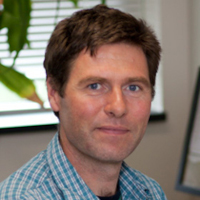
- This event has passed.
Stefan Gerber (UF Soil and Water Sciences)
March 28, 2019 @ 12:50 pm - 1:40 pm

Reflections on the use of models to study global environmental change
The work of my lab revolves around the mathematical modeling to understand interactions between major elements that cycle between atmosphere, land and ocean, between life and environment. The cycle of the major elements carbon, nitrogen and phosphorus touches our existence, in terms of feeding a global population, maintaining healthy water, and curbing greenhouse gas accumulation in the atmosphere. We use biogeochemistry modeling as important tool to scale up from local levels to landscape and global extent. Further, modeling also helps to project and quantify effects of climate change as it offers glimpse in a world that we have not experienced. Finally, modeling also helps to explore hypotheses in a safe and inexpensive sandbox.
The talk will explore these different types of modeling using examples from carbon and nutrient cycling. The imaginary tour through our biogeochemistry lab will show the application of global land biogeochemistry models and how they are used to quantify Earth-system wide consequences of carbon and nitrogen cycling. We will then touch upon landscape effects, to infer the drivers of nutrient losses from watersheds and delivery into downstream water bodies. Finally, we will zoom in into the world of microbes to examine different hypotheses on microbial growth, and how these hypotheses lead to large uncertainty when predicting how anthropogenic greenhouse gases are mitigated. Much of the work shows that modeling is still relatively underused in biogeochemistry and should encourage researchers in the field to try dynamic modeling in order to add context to empirical results.